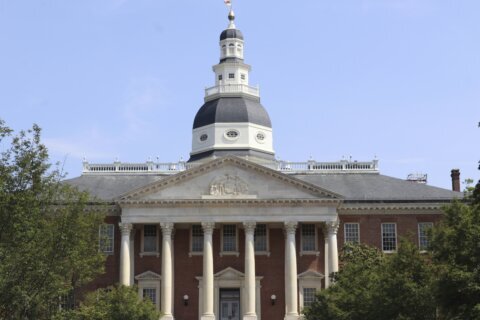Thousands of people have been pardoned of their marijuana convictions in Maryland, in a historic move from Gov. Wes Moore that he said is the “most sweeping state-level pardon in any state.”
Heather Warnken is the executive director of the Center for Criminal Justice Reform at the University of Baltimore Law School. She joined WTOP’s Anne Kramer and Kyle Cooper to talk about the pardons.
The transcript below has been lightly edited for clarity.
Kyle Cooper: Heather, you work to right wrongs and bring about equal justice all the time. How would you characterize what the governor did today?
Heather Warnken: Oh, this was an incredible, historic day. And we are just so energized by the momentum of this moment — really proud to have been a part of it, and really, truly, grateful to the Moore administration for their leadership on this.
Anne Kramer: Heather, the governor talked about that more Black and brown people have been arrested and convicted of these type of marijuana crimes compared to white people. And that the convictions have an impact on a whole host of things in their lives. Help us better understand and explain for us what he’s talking about there.
Heather Warnken: The collateral consequences of a conviction are nearly immeasurable. They create barriers for people spanning education, access to employment, housing, professional licensure and more. And I think some people don’t appreciate that those types of barriers can also accompany misdemeanor convictions, not just felonies on people’s record. So to be able to remove those barriers is so huge.
Kyle Cooper: Yeah Heather, help us understand the nitty-gritty of this pardon. Does this mean that people’s individual records, they’re essentially wiped clean, like an expungement?
Heather Warnken: So a pardon is actually different than an expungement. A pardon is an act of complete forgiveness that essentially absolves an individual from the guilt of that past criminal offense. It is a profound power that exists in the governor’s hands alone. Whereas an expungement — also a really important piece of this puzzle — is what actually clears the existence of that past conviction off of someone’s record. And that’s why a big topic in the press conference Monday (was) that the pardon is just one piece of the puzzle. There’s a lot more work and a lot more steps that go into addressing the inequity that follow so much of the criminalization of the drug war.
Anne Kramer: So do you expect then, Heather, expungement will be next? Because I would think that it would still be. You were mentioning about how much this impacts their lives that they’re convicted of this and the pardon helps, but that’s still there on their record, correct?
Heather Warnken: Right, so actually, as part of Maryland’s legalization, there’s an automatic record clearing that will accompany simple possession convictions for many Marylanders. But that doesn’t mean there’s not a lot of expungement access work also ahead. And we talked about that Monday, the work to do in the legislature to make access to expungement more accessible for Marylanders. And we actually had a bill that members of the Maryland expungement coalition, along with our center, worked on this past session, to bring clean slate in Maryland where people can get those records automatically cleared without having to go through the process in court.
Get breaking news and daily headlines delivered to your email inbox by signing up here.
© 2024 WTOP. All Rights Reserved. This website is not intended for users located within the European Economic Area.







